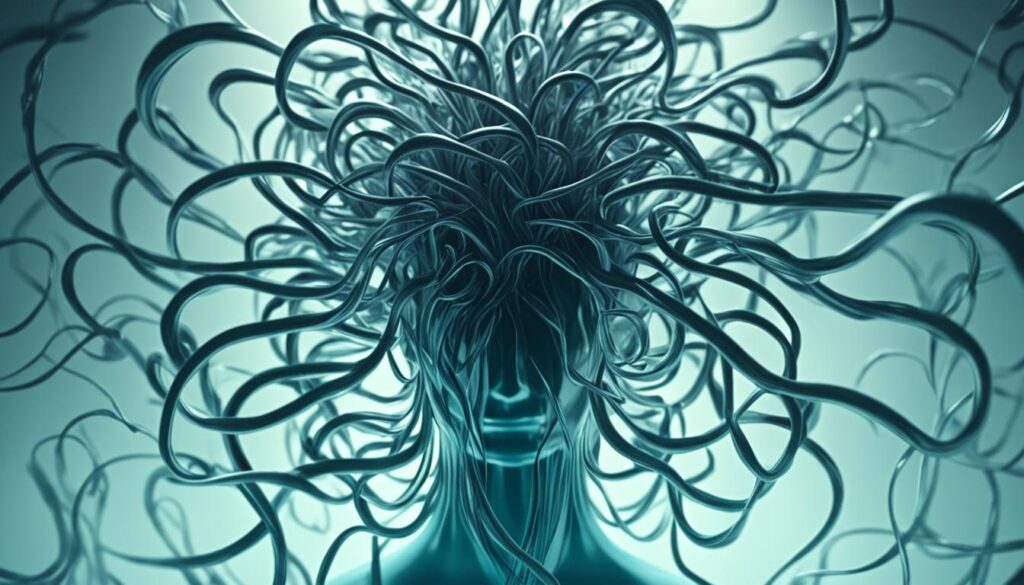What Do Your Nightmares Really Mean?
Nightmares may be scary, but they teach us a lot. They show us what’s in our heart, our worries, and our fears. This guide looks into what your nightmares really mean. We’ll talk about what they usually show, what signs to look for, and how stress and trauma play a part. This will help you understand your nightmares better, whether they happen a lot or just once in a while.
Understanding Nightmares: A Window into Your Subconscious
Nightmares are weird and cool parts of our minds. They give us a sneak peek into what’s going on deep down. It’s like our brain is putting on a show with scary pictures, mixing feelings, memories, and things we’re worried about. This gives us clues about ourselves that we might not see when we’re awake.
When scary dreams happen, our brain gets super active. It’s trying to make sense of things from our past and present. This helps us understand our worries, fears, and things we need to deal with better.
“Nightmares are not just random occurrences; they are a manifestation of the complex interplay between our conscious and subconscious minds.”
So, looking into our nightmares can actually help us know ourselves better. We can understand why we react the way we do to things. Plus, we might learn why we feel certain ways, helping us feel better over time.
If you often have bad dreams, don’t worry. Exploring our deep thoughts and feelings can be good for us. It helps us grow as people. So, facing what our dreams show us can make us more aware of who we are.
Common Nightmare Themes and Their Symbolic Meanings
Nightmares often show the same things like falling or being chased. They might tell us what’s really bothering us. By knowing what these nightmares mean, we can learn more about ourselves.
Many people dream they are falling, which might mean they feel they can’t control things. Also, if someone often dreams of being chased, it could show they have a lot of worries or that they need to deal with their big fears.
Feeling trapped in a dream might mean someone feels they can’t do what they want or that they feel stuck. Dreams of not being able to move or talk could mean someone feels they have no power or that they need to speak up more.
Bad dreams where someone’s loved ones are hurt can be very tough. But they often show a deeper fear of loss, change, or how weak our relationships might be. Dreams of failing at a task could show that someone feels they are not good enough and that they need to be more organized.
Knowing what these nightmares mean can help us deal with deep thoughts and feelings. This can help us understand ourselves better and deal with the real issues that are bothering us.
nightmares and their meanings
Nightmares can make us feel scared and uneasy. But they can show us what worries us deep down. This helps us learn more about ourselves and find ways to deal with scary dreams.
Have you ever dreamt of falling or being chased by something scary? Many of us have. These dreams often reflect our biggest worries. They might come from things that happened in the past, things that stress us now, or hidden fears. By looking at what these dreams mean, we can see what’s really bothering us inside.
“Nightmares are not random occurrences; they are the mind’s way of processing and making sense of the challenges we face in our waking lives.”
Our nightmares can be about many things. They might be about being afraid to fail, worrying when we have to speak in public, or losing someone we love. When we understand what these scary dreams are trying to tell us, we can learn more about ourselves. This can help us face our worries head-on.
The Impact of Stress and Trauma on Nightmare Frequency
Stress and trauma can make our nightmares happen more often and feel stronger. When we face a lot of stress or we haven’t dealt with tough feelings from hard things we’ve been through, our mind might dream a lot.
When we’re really stressed, our brain feels like danger is all around. This makes it pump out more stress hormones like cortisol. Then, our sleep gets messed up, and we might have more nightmares and other sleep problems.
“Trauma, whether it’s from a single devastating event or ongoing abuse, can have a profound impact on our dream interpretation and the frequency of our nightmares,” explains clinical psychologist Dr. Sarah Lowe.
If someone has lived through trauma like being hurt, a disaster, or war, they might have lots of nightmares. These bad dreams can help their mind deal with the hurt and fear from the past.
Knowing how stress and trauma can lead to more nightmares is helpful. It can lead people to find ways to take care of their mental health better. They can learn to cope with these hard dreams.
Decoding Your Personal Nightmare Symbols
Nightmares are different for everyone. They often show what we’re really worried about. By looking at what your nightmares mean to you, you can learn more about your hidden feelings and fears.
Things you dream about come from your experiences and what you believe. A scary animal might mean feeling weak to one person. But to someone else, it might show their wild side.
To understand your nightmare symbols, think about how they felt. What part of real life do they show? This can help you learn more about your dreams and yourself.
“Our dreams are a window into the subconscious, revealing the hidden thoughts, fears, and desires that shape our waking lives. By decoding the personal symbols in our nightmares, we can gain invaluable insights into our inner worlds.”
Figuring out your own nightmares is personal. It lets you know about yourself and why you dream those scary dreams. Embrace what your nightmares tell you to learn more about yourself.
The Role of Medications and Substances in Nightmares

Stress, bad experiences, and your mind are the main reasons for nightmares. But some drugs, both medical and fun, and alcohol can make dreams scarier.
Antidepressants, blood pressure drugs, and sleep aids might change how your brain works. This can lead to odd and scary dreams. Drugs like speed, acid, and downers can do the same, making your nightmares feel real.
“The effect of drugs and pills on nightmares is complex,” says Dr. Emma Rowe. She’s an expert on sleep and dreams.
If you’re having lots of bad dreams, talk to your doctor. Maybe a drug you’re taking is making it worse. If you stop or change the drug, your dreams might get better.
Childhood Nightmares: Causes and Prevention
Nightmares are not just for grown-ups. Kids have them too, and they can be very scary. Nightmares trouble kids more because their brains are still learning about the world.
The reasons for childhood nightmares vary. They might come from scary things seen on TV or from bad feelings. It’s important to figure out why these nightmares happen. This helps in stopping them.
“Addressing childhood nightmares early on can help promote healthy emotional development and ensure a good night’s sleep for young individuals.”
Parents and caregivers are key in stopping nightmares. They should make sure kids have a relaxing bedtime. Also, they should not let kids watch too many scary things. It’s good to talk openly about dreams.
Getting help from experts can also make a big difference. Child therapists or sleep doctors may help. They can discover why the nightmares keep happening. Then, they can teach kids to deal with them in a healthy way.
Seeking Professional Help for Persistent Nightmares

Nightmares happen to many people. But if they keep coming back, professional help might be needed. Working with a mental health expert can help understand why nightmares occur. This can make dealing with them easier.
If nightmares bother you often, therapy is a great option. Therapists know how to find out the deeper meanings of nightmares. They can also spot the feelings or thoughts causing them. Then, they use proven methods to make the bad dreams less frequent and scary.
Chronic nightmares could signal a bigger issue. This might be PTSD, anxiety, or depression. Seeking professional help opens the door to special care. It helps make a plan to tackle the real reasons for the nightmares. This can improve your life and happiness.
Help can come in many forms, like talking therapy or understanding dreams. With the right expert, fixing persistent nightmares is possible. It can really change how you feel and help you feel in control again.
Conclusion
Nightmares are scary, but they can help us learn and grow. We can understand them by looking at their themes and meanings. Also, we can see why they happen often and are so scary. This understanding lets us see deep into our thoughts, feelings, and fears. By doing this, we learn more about ourselves and how our mind works. This way, we can get better at dealing with and avoiding these bad dreams.
Finding meaning in our nightmares is unique to each of us. We look at the symbols in our dreams to find their messages. This helps us grow personally. It lets us handle and solve the issues that make us have nightmares. Dealing with these issues can make our bad dreams go away.
If you often have bad dreams or just want to understand them better, this guide is for you. It can help you learn a lot about yourself. You will become more aware of who you are. This can lead to a happier and more powerful life.






